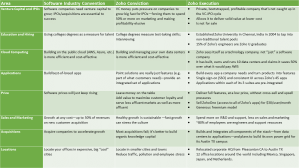According to Raju Vegesna, Chief Evangelist at Zoho, “Thoughts become opinions, which evolve into convictions.” As we heard from Vegesna at the Toronto ZohoOne event in early November, Zoho holds some very strong convictions that have put it on a very different path than most of its industry contemporaries.
 More important, Zoho’s unconventional approach (click here for more details) is working. Over the past 20 years, Zoho has (somewhat quietly) grown into a profitable, global company, with 10 data centers, 45 business applications, and over 50 million business users in 180 countries. With its recent launch of Catalyst, its no-code, low-code, and pro-code application development platform, Zoho is also extending its presence in the developer space.
More important, Zoho’s unconventional approach (click here for more details) is working. Over the past 20 years, Zoho has (somewhat quietly) grown into a profitable, global company, with 10 data centers, 45 business applications, and over 50 million business users in 180 countries. With its recent launch of Catalyst, its no-code, low-code, and pro-code application development platform, Zoho is also extending its presence in the developer space.
As its growth trajectory accelerates, a growing number of prospects and competitors are starting to view Zoho in a different light. As the company’s image evolves from that of a quirky, low-cost underdog to a more formidable, value-based competitor, Zoho remains true to its convictions.
Whether you agree with them or not, they are definitely food for thought. So, here’s a cheat sheet on why and how Zoho’s convictions run counter to industry conventions.
The Zoho Whole—Greater than the Sum of Its Convictions
Each of Zoho’s applications has value on its own. But when combined in ZohoOne, the whole delivers greater value than the sum of its parts.
The same holds true for Zoho’s convictions. Taken together, they paint a picture of a company that is thinking long-term, not short-term. Zoho’s employees seem to agree: at just under 2%, its annual employee attrition rate is among the lowest in the industry. The company prides itself on providing a “freshness of spirit” often lacking among companies under pressure to grow at any cost.
These convictions are also resonating with customers, as evidenced by Zoho’s expanding customer base. Zoho is adding more customers to its ranks, and is also expanding beyond its small business roots into the midmarket. And, while more than half of Zoho’s customers are in North America, Zoho is diversifying into new geographies, especially in high-growth emerging markets.
Perspective
I’ve been fascinated by Zoho since I was first introduced to the company in the early 2000s. It has always taken its own path and fostered a unique vision in the market.
Zoho has never invested as much in sales and marketing as its competitors. But it does appear that Zoho has realized that people can’t choose to buy something if you don’t know about it. As a result, Zoho has expanded its marketing, sales and influencer initiatives over the last couple of years. For instance, Zoho has held over 350 events in the past year and will host its third annual analyst and influencer event in January 2020.
If Zoho holds true its convictions, it will never spend 50% of its revenues on marketing. However, as evidenced by its recent growth spurt, it seems that its modest expansion in this area is paying off, and should continue to do so.
Coupled with broader awareness, Zoho’s value proposition puts it in a good position to benefit from other factors as well, such as demand in high growth, yet cost-sensitive emerging markets. Zoho also stands to benefit if the uncertain U.S. economy sparks recessionary fears.
While Zoho’s convictions aren’t likely to topple the very ingrained conventions of the incumbent software model, it is likely to mount an increasingly thought-provoking alternative to it.
© SMB Group
Source: Laurie McCabe’s Blog

